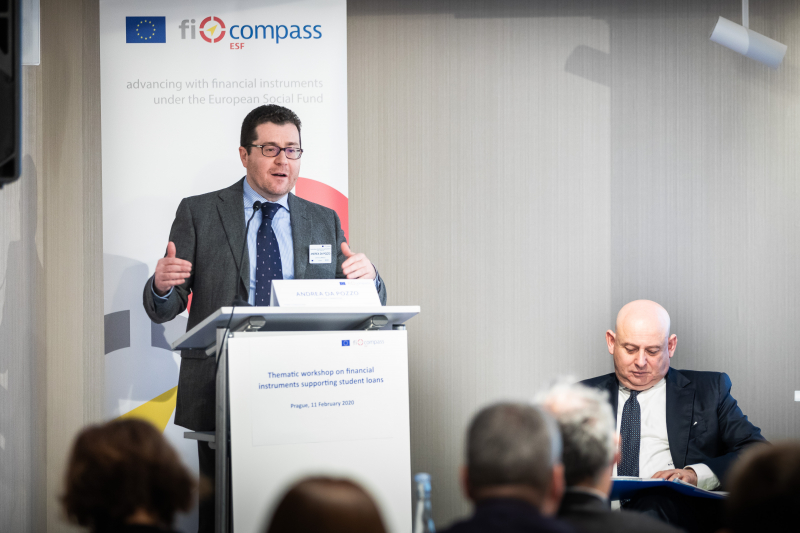ESF financial instruments for student loans to leave no one behind

A skilled and qualified workforce is the cornerstone of a competitive economy and an inclusive society. In light of the funding gap in this field, financial instruments constitute a potential solution due to their capacity to provide long-term affordable finance to those who need it most.

70 experts from across Europe discussed the opportunities and challenges of setting up financial instruments aimed at facilitating higher education for students, workers and citizens at large. Copyright © European Investment Bank 2014-2020
The potential to shape and capitalise on the promises of digitalisation and automation largely rests on having an agile workforce with the right skills for jobs that yet have to be created. How can more students be encouraged to pursue and successfully finish science, technology, engineering and mathematics education and workers upskill or re-skill through vocational education and training?
More than 70 experts from across Europe gathered in Prague on 11 February 2020 to hear about this topic in a fi-compass Thematic workshop on financial instruments for student loans organised on behalf of the European Commission – Directorate General for Employment, Social Affairs and Inclusion in partnership with the EIB.
The workshop featured financial instruments targeted to student loans and, more broadly, education, training and learning. Andrea Da Pozzo from DG EMPL at the European Commission shared with the audience the increase in the take-up of financial instruments under ESF in the current programming period: a total of 51 ESF financial instruments are currently operating across Member States with some EUR 815 million of committed resources and approximately EUR 49 million paid to final recipients.
An essential educational package in the digitalisation and automation era

Andrea Da Pozzo, DG EMPL, European Commission shared with the audience the increase in the take-up of financial instruments under ESF in the current programming period. Copyright © European Investment Bank 2014-2020
Achieving higher education level for students, workers and citizens at large is becoming increasingly important in the light of the transformation already underway of the economy and employment landscape in the EU, led by digitalisation and automation processes. Furthermore, the European Commission’s Green Deal will accelerate the reduction in certain types of jobs related to highly polluting activities, which reinforces the challenge to re-skill and up-skill the concerned workforce in order to make sure that “no one is left behind”.
Against this backdrop, financial instruments can stimulate investment from financial intermediaries and businesses that are committed to support people’s education and skills, thus helping to ease the burden from Member States’ public budgets.
Financial instruments already supporting students in Portugal, Italy and Malta
ESF – with resources from thematic objective 10 ‘Investing in education, training and vocational training for skills and lifelong learning’ – is already involved in this process, and managing authorities willing to take action can find inspiration in three case studies from southern European countries that were presented during the workshop.
First, in Portugal, the managing authority of the Human Capital Operational Programme has set aside EUR 10 million, used by the Sociedade Portuguesa de Garantia Mutua to guarantee banks which, in turn, will build up new portfolios of loans for students. The instrument which has a multiplier of around six times has so far supported almost 750 students in Portugal.
Further East, in Italy, the Ministry of Education, University and Research entrusted the EIB to manage a fund of funds for the implementation of the Student Support financial instrument which has an ESF allocation of EUR 100 million from the national Operational Programme (OP). The selected financial intermediaries will on-lend the OP resources to students based in Italian southern regions who will benefit from loans with a zero-interest rate.
Finally, in Malta, the ESF managing authority has set up the Further Studies Made Affordable (FSMA) financial instrument, a EUR 2 million pilot guarantee scheme combined with interest rate subsidy rolled out by the Malta Development Bank, which provides post-graduate students with access to the funds they need to go further in tertiary education and beyond. These will benefit from zero interest payment during the moratorium period and they will not be requested to provide an upfront contribution. With 56 recipients to date, this pilot has made the case for its repetition in the future.
Looking ahead, at central level the European Investment Fund is ready to launch the Skills and Guarantee Pilot under the European Fund for Strategic Investments (EFSI), a facility that will provide guarantees covering loans extended by financial institutions to students, enterprises willing to reskill and upskill their workers and universities willing to defer tuition fees.

